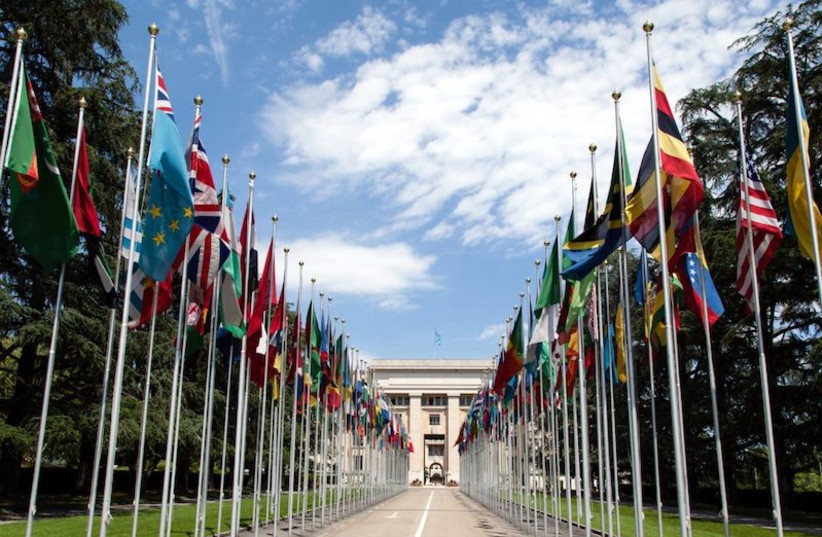Sunday’s government decision “proves the seriousness” Israel is placing on the issue of environmental sustainability.
Published: JULY 10, 2023

(photo credit: ELAD ZAGMAN, GPO
The cabinet approved Israel’s participation in the United Nations Climate Change Conference, COP28, on Sunday and said it would allocate NIS 9 million to its efforts. The coalition also expressed its commitment to pass a climate law before the conference, which runs from November 30 to December 12 in Dubai.
“We are committed to the important international effort to reduce pollution and protect the environment,” Prime Minister Benjamin Netanyahu said at the start of the weekly cabinet meeting.
Israel said last week that it would send a delegation of 1,000 people to COP28, including 130 climate technology companies. Dubai is expected to host some 80,000 people from 198 countries.
“The climate crisis is a global crisis that requires international mobilization,” said Foreign Minister Eli Cohen. “Allocating resources will allow us to prepare for the international climate conference in the best possible way. Our activity on this issue is an integral part of our regional strategy, and we are working to find cooperation in the fields of energy, water and food security in the Middle East and beyond.”
He said the government decision “proves the seriousness” Israel is placing on the issue of environmental sustainability.
Was “Implementation” the Right Theme for COP27? (credit: PBS)
The Israeli delegation will include representation from a dozen ministries – Environmental Protection, Foreign, Energy, Transportation, Regional Cooperation, Innovation, Science and Technology, Economy, Agriculture, Defense, Health and Intelligence – plus the Israel Innovation Authority. Individuals from the government, public, academic, civil society and business sectors will attend to foster cooperation in the fields of climate, environment, renewable energies, food security, agriculture and more.
Israel has a robust climate technology sector
Israel has a robust climate technology sector. According to data provided by Start-Up Nation Central earlier this year, the country is home to some 850 climate-tech companies that have received funding or grants in the last two years. In 2022, climate-tech start-ups represented 19% of all the new Israeli start-ups, up from 11% the year before.
Cohen said last week that one in every seven new Israeli start-ups is now operating in some capacity in the climate-tech industry.
However, as Israel promises to bring the technologies necessary to fight the climate crisis, it remains one of the few developed countries to have not enacted a climate law.
The Environmental Protection Ministry updated previous climate bill proposals earlier this year and presented a binding framework for Israel’s efforts to combat climate change. Yet, the legislation has not moved forward due to opposition from the Energy and Finance ministries.
The climate bill initially proposed measures for the country to reduce greenhouse gas emissions to 50% of what they were in 2015 by 2030 and for Israel to become a zero-emissions net economy by 2050. The 2030 goal has since been reduced to 30%, which is 3% more than Israel committed to as part of the Paris Agreement but much less than the 45%-55% reductions committed by other Western countries such as the United States.
The legislation is also meant to create a process for dealing with the climate crisis, such as applying a duty to assess the climate risks of large government programs.
Once the bill receives approval from the Ministerial Committee on Legislation, it would require approval by the Knesset before becoming law.
“We must come to the convention with real news about Israel’s contribution to the fight against climate change in the form of the climate law that we are promoting,” Environmental Protection Minister Idit Silman stressed. “An ambitious [climate] law puts Israel on par with the world’s developed countries.”
Recent reports have shown that Israel is lagging grossly behind other nations in reducing emissions. Israel is expected to reduce emissions only by up to 27% by 2030, compared to countries like Britain (68%), the United States (49%) and Japan (43%).
Besides approving Israel’s participation in the conference, the government also approved the preparatory steps for COP28, which the Foreign and Environmental Protection ministries will lead. It was also decided to establish a steering committee to be jointly chaired by Foreign Ministry Director-General Ronen Levi and Environmental Protection Ministry Director-General Guy Samet, with the participation of the directors-general from the other participating ministries.
Israel will establish a national pavilion at the conference, similar to what it had set up at COP27 in Sharm el-Sheikh. The steering committee will determine the content of the pavilion.
Member states and observer organizations may set up booths and produce side events at the conference. As part of the Israeli pavilion and through the side events, the ministries said that Israel hopes to present its capabilities in climate innovation, including sharing blue-and-white technologies that could reduce greenhouse gas emissions and help mitigate the climate crisis.
The country will brand its pavilion “Climate of Innovation.” Thirty companies will be selected by the Israel Innovation Authority to present in the pavilion.
The proposal includes reference to several specific initiatives Israel plans to promote at COP28, including its work with the “Great Green Wall” countries of the United Nations that earlier this year took part in a joint program between the DeserTech Community in Israel and the United Nations Convention to Combat Desertification (UNCCD) to find innovative solutions to tackle their most critical desert-related challenges.
However, the environmental NGO Adam Teva V’Din condemned the government’s decision, calling the country’s participation in COP28 “a colossal waste of time.”
“The government committed to passing a climate law within six months, and in reality, we are left with empty words; there is not even a deadline for bringing up the law,” the organization said in a statement. “Not only is the legislation not ambitious when compared to the updated legislation in Europe, but at the same time, the state is taking anti-environmental measures such as canceling the tax on single-use plastics or opening the sea for more gas and oil exploration.”
https://www.jpost.com/environment-and-climate-change/article-749363

